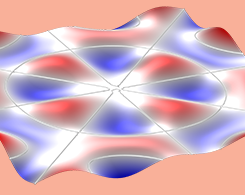General Blog Posts

How to Implement the Weak Form for Time-Dependent Equations
Here’s a comprehensive equation-based modeling guide on how to implement the weak form for time-dependent equations, including theoretical background and step-by-step instructions.

Image Denoising and Other Multidimensional Variational Problems
Learn how to solve variational problems featuring multiple dimensions, higher-order derivatives, and multiple unknowns with a fun example: image denoising in a grainy photograph.

Methods for Enforcing Inequality Constraints
Learn 2 methods for enforcing inequality constraints in your variational problems, the Lagrange Multiplier method and Augmented Lagrangian method, as well as the theory behind them.

Methods for Dealing with Numerical Issues in Constraint Enforcement
This post is helpful if you use equation-based modeling: Learn a variety of different methods for dealing with numerical issues when enforcing constraints in variational problems.

Specifying Boundary Conditions and Constraints in Variational Problems
In part 2 of a blog series on solving variational problems in COMSOL Multiphysics®, we discuss how to specify general boundary conditions and constraints.

Introduction to Modeling Soap Films and Other Variational Problems
In this introduction to a 5-part series, learn how to solve variational problems using equation-based modeling, which is useful for modeling soap films, catenary cables, light beams, and more.

How Do Chladni Plates Make It Possible to Visualize Sound?
Is it possible to see sound? Find out for yourself in this blog post on the acoustics behind Chladni plates.

How to Analyze a Glacier via Gradient-Based Optimization
This post highlights a gradient-based optimization method that geophysical engineers can use to analyze, for instance, the movement and sensitivity of a glacier.
